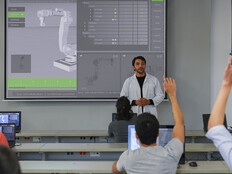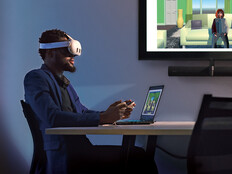How Technology is Enhancing the Classroom Experience for Law Students
North Carolina Central University has joined neighboring Duke University at the vanguard of law schools using technology to train next-generation lawyers.
“Our technology is comparable to the technology found at Duke,” says Greg Clinton, IT director of the School of Law at NCCU. “In fact, Duke has been a great neighbor, and I don't mind being a short distance behind them in technology.”
Every classroom in NCCU's law school is equipped with smart screens, sophisticated sound systems and Internet connectivity – wired and wireless. The capacity to send, receive and record voice, sound and rich media allows for international teleconferencing, videoconferencing, closedcircuit broadcast of on-campus events and in-class review of photos, legal text and video clips pertaining to relevant legal principles.
There are two distance-learning classrooms and a 30-foot projection screen in the school's Great Hall. The ability to capture virtually everything electronically facilitates archiving and dissemination of classroom lectures via podcasts and other means.
Having reached a critical mass of technological capacity, the law school last year adopted a paperless admissions process and eliminated all paper applications. Instructors post syllabi and other materials on an electronic bulletin board. Some 84 percent of full-time professors have jettisoned their desktop computers in favor of mobile notebook computers, and 96 percent of them are using technology in the classroom. The vast majority of students take exams on their notebook computers.
18th nationwide – the ranking National Jurist magazine gives NCCU's law school on its technology honor roll.
The law school building can accommodate up to 500 simultaneous wireless connections to the Web. A computerized surveillance and security system controls access to the building, and automated climate functions control heating and air conditioning. Computers are topshelf, copiers are digital, and printers and scanners are networked.
Confronting the Situation
When Clinton arrived at NCCU in 1998, the law school's technology was way behind.
“We were not using PowerPoint, the computer labs were bad, and we were three generations of computers behind,” he says, referring to machines that used 486 chips running at 25 megahertz. A campus visit by the American Bar Association (ABA) found leaky roofs, malfunctioning heating and air-conditioning systems, and “poor support for the law school's computer needs.”
Of 150 law schools that responded to an ABA survey measuring computer support, NCCU ranked 143rd.
“We were at the bottom of the barrel,” says Clinton.
He set to work, buying computers with Pentium processors, ditching the school's ink-jet printers and introducing the faculty to Dragon Naturally Speaking voice-recognition software. He joined the committee that was planning an expansion and renovation of the law building.
By 2002, the law school had unveiled its first digital classroom and “leaped into a different arena,” says Clinton. For the first time professors had, at their fingertips, the ability to project and manipulate text and images on smart screens.
“It's just so much fun,” says Deborah Jeffries, law librarian and instructor for a course on legal bibliography and advanced legal research. “You're just touching and talking.”
A $7 million state bond referendum and $2.2 million Title III federal grant brought smart technology to every classroom and allowed the law school to make a technological leap. National Jurist magazine ranks NCCU's law school 18th in the nation on its technology honor roll. The ABA revisited NCCU again this year. Its conclusion: “Technology is an obvious strength of the law school.”
Reaping the Benefits
Given the opportunity to use technology, professors and students at NCCU's law school have embraced it.
“The great thing about smart classrooms is the ability to excite visual learners,” says James P. Beckwith, a law professor at NCCU. “It gives you control and accessibility to a large group. No one is left out of the loop because they are sitting in the last row and they can't hear or see. You can focus on what really matters, and that is interacting with students, evaluating their performance and doing an effective job in the classroom.”
Second-year law student William Dudley says he is impressed by the way older faculty members have taken to the technology. “A lot of our law professors are old-school attorneys from back in the day when you had to write briefs by hand and type them on the typewriter,” he says. “It's OK to be old school, but sometimes you want that new-school flavor.”
Jeff Carmon, a third-year student, says the ubiquity of technology at the law school “creates an environment where you continually want to grow with the technology.”
Benefits that accrue from technology investments can be difficult to quantify. “You can't measure return on investment,” says Clinton, “but you know your quality of life has definitely gotten better. People can work in comfort. They can work anywhere.”
The success of the law school notwithstanding, the big wave of technological advancement has yet to come, predicts John Mayer, executive director of the Center for Computer-Assisted Legal Instruction.
“The digital natives,” he says, “aren't necessarily in law school yet.”
Getting More Bang for Your Buck
North Carolina Central University Law School IT Director Greg Clinton got up to speed by checking out technology at more than a dozen law schools. Here are his tips for maximizing the impact of your investment:
- Let end users dictate the direction of your technology program, or you may end up buying a lot of technology that just stays in the box.
- Don't reinvent the wheel. There's a learning curve for using technology, so look at what other schools are doing.
- Ensure that upper management supports your plan. Get buy-in from the top.
- Create a user-friendly environment. Make sure no computer issue is too small or too big – and give the end user your undivided attention.
- Vendors are more than suppliers. They are partners. You cannot replace their expertise. You cannot manufacture it yourself.







